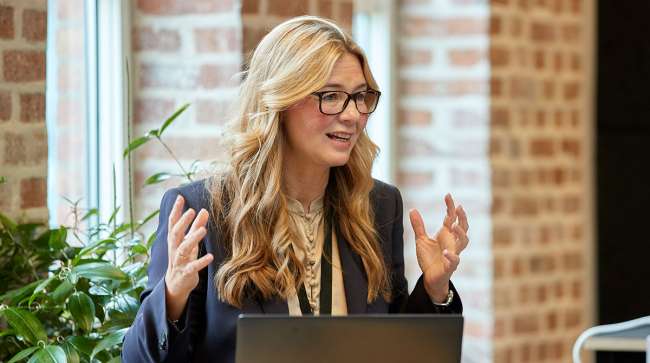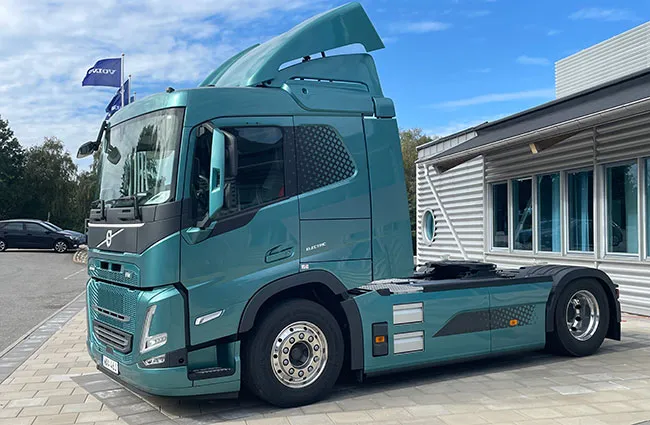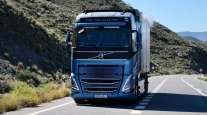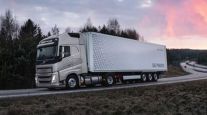Volvo Energy Developing Second-Life Plans for Truck Batteries

[Stay on top of transportation news: Get TTNews in your inbox.]
GOTHENBURG, Sweden — Executives from Volvo Energy said they are developing long-term life cycle plans for batteries used in their electric trucks, built around a regional model where batteries start a second life for use in energy storage in the same area where their first life in the vehicles ends.
“Volvo Group wants to maximize the battery throughout the life cycle — in its first life, in its second life, in recycling,” Elisabeth Larsson, head of sales and service for Volvo Energy, said during a Sept. 14 media presentation from Volvo Group headquarters. “We want to make sure that we utilize — to the max — those minerals that we have already taken out of the earth [and] the resources that we have put into producing the batteries.”
Volvo Energy, part of Volvo Group, is researching ways to extend the life of the batteries in electric vehicles now being deployed by Volvo Trucks. Larsson said the company believes energy storage applications are a key opportunity that will become more important in the years ahead.
“Sending that battery to recycling after its useful life ends in the truck is not maximizing it, and it is not a cost-free alternative today,” Larsson said. “But with technology changes, tomorrow we will extract the most from that battery.”

Volvo is developing long-term life cycle plans for batteries, including the type that powers this FM Electric model. (Joe Howard/Transport Topics)
As for how they might be used in a second life, Larsson said on-site energy storage for customers who have electric vehicles would be a key opportunity.
“Battery-energy storage systems are products customers are going to need for charging equipment [or] supporting micro-sites,” she said, noting that customers could ensure cleaner operations by storing energy produced by clean sources such as wind and solar.
“When the wind is not blowing and sun is not shining, you can store energy in these,” she said. “We think that is a beautiful and enticing story.”
Larsson explained that the company is researching a business model in which batteries are redeployed as a regional business. “Moving the battery is not a good idea,” she said. “We would like the battery’s first life to end where the second life starts.”

Gragg Wilson of UPS won grand champion honors at the National Truck Driving Championships. Wilson takes us through the competition's course, successful driving practices and how to attract new drivers. Tune in above or by going to RoadSigns.ttnews.com.
To realize that vision, she said Volvo Energy will need to develop regional expertise and infrastructure dedicated to batteries.
“We see this as batteries as a regional business,” Larsson said. “Remanufacturing, refurbishing — all of that needs regional experience and competence.” But she noted this kind of work won’t be handled at a dealership.
“This is something that will be handled by Volvo Energy itself,” she said. “That will require an infrastructure. “We have to have business models where the customers let us take that responsibility.”
Larsson noted, however, that these long-range plans are not an indication that the company is looking past ensuring a long life for batteries while they are in the trucks.
“It all starts with the battery,” she said. “It is becoming the most important component of electric vehicles. No longer is it the gearbox or the engine; it’s the battery.”
Larsson added, “It is natural for us as a producer of vehicles and user of batteries to take a bigger responsibility for that battery’s performance.”

"These batteries are our babies — we know everything about them," says Kristina Nilsson, head of charging and infrastructure. (Lars Ardarve for Volvo AG)
That means Volvo Energy monitoring that battery throughout its life span, even though it is in a truck owned by a customer.
“These batteries are our babies — we know everything about them,” said Kristina Nilsson, who oversees charging and infrastructure for Volvo Energy. She stressed that data that is mined throughout the batteries’ life span informs the company on how they are performing, and whether they are nearing the end of their useful life in a truck.
“We don’t have to wait for it to break down,” she said. “We already know how it’s feeling.”
In a separate presentation, Peter Granqvist, Volvo Group senior vice president for electromobility, also invoked a parenting example to describe the care that must be taken throughout the batteries’ life span.
“The batteries are extremely sensitive — like carrying little babies,” he said. “Unless we control them in a smart way, they will not last. This is new to us, and new to the industry.”

Granqvist
He noted that the company is monitoring data from electric trucks on a monthly basis, and stressed that there remains much to be learned.
“It is a continuous iteration that we look at all the time,” he said. “You need to evaluate this all of the time.”
Nilsson noted that the batteries are designed for optimized charging and use cycles.“It is difficult to abuse the batteries with the intelligence that is built in,” she said.
Larsson added this longevity is achieved through a design that will ensure a more useful second life for truck batteries.
“The truck will not allow you to fully discharge the battery, and it will also encourage you not charge at 100 [percent] if you can avoid it,” she said, pointing out that the system is designed to prevent charging the battery too high or draining it too low, both of which can be detrimental to battery health.
“They will have a better second life because this has been taken care of,” she said.
Want more news? Listen to today's daily briefing below or go here for more info:




